Richard Kogan, an award-winning psychiatrist and pianist, sees Beethoven as more than just the mad genius he’s often portrayed as. The composer also has “an extraordinary story of recovery from trauma,” says Korgan, who will lecture Thursday night on the subject at the CU Anschutz Campus.
A concert pianist since the age of six, Kogan studied at Juilliard in a pre-college program before attending Harvard as a music major where he roomed with Yo-Yo Ma. But a career as a pianist was only half of what Kogan had in mind for himself.
“I’m not sure that I always knew that I was interested in medicine, but I think the workings of the mind always interested me,” he says. “I wanted, at a certain point, to really see if I could study the mind and the brain, and I thought that a career as a psychiatrist would satisfy some of that.”
So Kogan returned to Harvard for medical school, started practicing as a psychiatrist, and continued with these dual but separate lives until 2001, when the American Psychiatric Association, aware of his reputation as a noted musician, asked him to do a symposium on creative genius and mental illness.
"I started researching these composers whose music I had played my entire life, and it was really eye-opening for me to actually explore the biographical details of these people,” says Kogan. “Everyone had these fascinating life sagas and dramas that really informed the nature of the music that they were creating. Beethoven was one of them.”
In his early twenties, when he started to lose his hearing, Beethoven had simply hoped the condition would go away or that he might find a cure. At a certain point, it became clear that the condition wasn’t going away, and Beethoven knew that his hearing loss would be permanent.
“It’s a hardship for anybody — ahuge hardship,” says Kogan. “But, for a musician, it’s catastrophic. It’s unimaginably catastrophic.”
And according to a letter that Kogan cites from this point in Beethoven’s life, the composer was so distraught that he considered suicide.
“But he decides, ‘No, I’m not going to do that. I’m going to try to fulfil my destiny,’” says Kogan. “It’s a truly extraordinary story. Deafness actually made Beethoven become an even greater composer. And I spent a lot of time thinking about how that’s even possible.”
Thursday’s hybrid lecture and performance by Kogan will delve into the question of how Beethoven might have created his greatest works, not in spite of his deafness, but because of it.
“I’m going to be playing music that he wrote in different phases in his career to talk about the impact of various forces such as deafness on his artistic evolution,” says Kogan. “Music can access places that our words are incapable of accessing. I think he was able to express himself more through his music than any other way.”
But Kogan cautions against seeing geniuses like Beethoven as some sort of proto-human god type. “Composers like Beethoven were just — as great and as immortal as they are — they’re really just people. They have psychological issues that are not necessarily that different from the psychological issues that a lot of my patients seem to have.
Beethoven: Triumph and Tragedy, 7 p.m., Thursday, November 9, Education II South Auditorium, CU Anschutz Campus, 13121 East 17th Avenue, Aurora, $20 suggested donation for the Anschutz Campus Choir and Orchestra.
[
{
"name": "Air - MediumRectangle - Inline Content - Mobile Display Size",
"component": "12017618",
"insertPoint": "2",
"requiredCountToDisplay": "2"
},{
"name": "Editor Picks",
"component": "17242653",
"insertPoint": "4",
"requiredCountToDisplay": "1"
},{
"name": "Inline Links",
"component": "18838239",
"insertPoint": "8th",
"startingPoint": 8,
"requiredCountToDisplay": "7",
"maxInsertions": 25
},{
"name": "Air - MediumRectangle - Combo - Inline Content",
"component": "17261320",
"insertPoint": "8th",
"startingPoint": 8,
"requiredCountToDisplay": "7",
"maxInsertions": 25
},{
"name": "Inline Links",
"component": "18838239",
"insertPoint": "8th",
"startingPoint": 12,
"requiredCountToDisplay": "11",
"maxInsertions": 25
},{
"name": "Air - Leaderboard Tower - Combo - Inline Content",
"component": "17261321",
"insertPoint": "8th",
"startingPoint": 12,
"requiredCountToDisplay": "11",
"maxInsertions": 25
}
]











